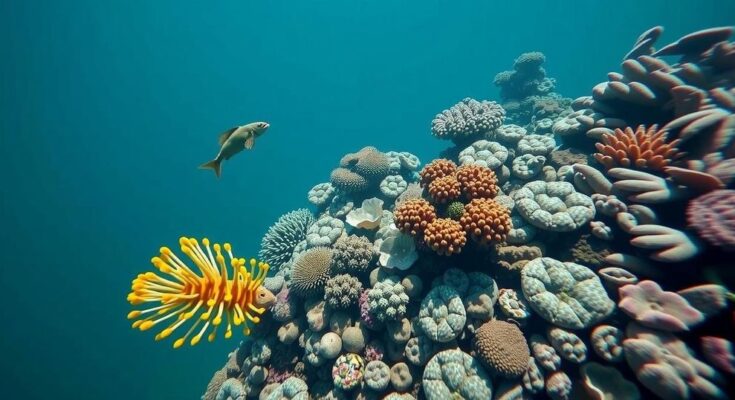The United Nations has convened an emergency session to address the alarming issue of coral reef bleaching, reporting that 77% of the world’s reefs are affected. This crisis has prompted significant financial commitments from multiple governments towards conservation efforts. Coral reefs are vital for marine biodiversity and human livelihoods, and urgent action is needed to protect them from climate change and pollution. Global leaders are called upon to enhance their funding pledges as future conferences approach.
The United Nations, alongside scientists and governments, issued a critical warning on Wednesday regarding the urgent need for increased funding to safeguard coral reefs, which are under severe threat of extinction. Current research indicates that approximately 77% of the world’s coral reefs are experiencing bleaching, predominantly attributable to elevated ocean temperatures resulting from anthropogenic climate change. This instance represents the largest and fourth mass bleaching event on record, affecting reefs across both hemispheres, as reported by the United Nations Capital Development Fund. The alarming findings led to an unprecedented emergency session convened by the U.N., typically reserved for escalating conflicts or natural disasters, on the sidelines of the ongoing U.N. biodiversity summit, known as COP16, presently concluding in Cali, Colombia. Coral reefs serve as crucial ecosystems that sustain over 25% of marine biodiversity and over a billion human lives who depend on these reefs for food security, coastal protection, and sustainable livelihoods, according to the U.N. development fund. Following the emergency session, governmental representatives from New Zealand, the United Kingdom, Germany, and France pledged a collective contribution of approximately $30 million to the U.N. coral reef fund, which was established in 2020. The objective of this fund is to leverage up to $3 billion by 2030 for public and private financing to bolster coral reef conservation initiatives. To date, approximately $225 million has been raised. Mary Creagh, the U.K. Minister for Nature, remarked, “Protecting our ocean and its precious habitats is fundamental to life on earth. But without urgent action, the world’s coral reefs face extinction from global heating, acidification, disease, and pollution; a vital ecosystem lost within our lifetime. ” In anticipation of the upcoming U.N. ocean conference set to occur in Nice, France next year, nations are being encouraged to augment their pledges to the U.N. global fund for coral reefs with the goal of mobilizing an additional $150 million in donations by the time of the conference. Peter Thomson, the U.N. Secretary-General’s Special Envoy for the Ocean, stated, “In 2024, climate change and other human impacts triggered the fourth mass coral reef bleaching event, the most extensive and devastating on record. With the window to protect these ecosystems closing rapidly, world leaders must act now.” He added, “We must secure a sustainable future for coral reefs and the countless lives that rely on them — before it is too late.” Shifts in water temperature can lead to coral expelling algae, which provides essential nutrition, resulting in bleaching. Other factors contributing to coral bleaching may include extreme low tides, pollution, or excessive sunlight exposure. In Australia’s Great Barrier Reef, the most expansive coral reef ecosystem globally, 90% of the coral assessed exhibited bleaching in 2022. In the Florida Coral Reef, the third largest, significant bleaching was also noted in the previous year. Historically, the first mass coral bleaching event occurred in 1998, followed by the second between 2011 and 2013, and the third in 2016, as articulated by Kenyan marine ecologist David Obura, who leads Coastal Oceans Research and Development in the Indian Ocean East Africa. He expressed concern, stating, “They are lasting more than one year at a time, which is worrying.”
Coral reefs are essential ecosystems that provide critical habitats for marine life and support human populations. However, they are increasingly threatened by climate change and other human-induced factors. The recent findings about the extensive bleaching affecting reefs globally underscore the urgency of addressing these threats through funding and policy change. The U.N. has recognized the need for immediate action to prevent further loss of these vital ecosystems, leading to the convening of an emergency session specifically to address the coral crisis. As coral reefs face unprecedented challenges, coordinated global efforts are necessary to protect and restore these ecosystems for future generations.
In conclusion, the alarming rise in global coral bleaching necessitates urgent action and increased financial commitment from governments worldwide. The recent emergency session held by the U.N. at the biodiversity summit highlights the critical need to protect these ecological treasures before they reach a point of no return. With substantial pledges already made, there is hope for mobilizing the required funds to support coral reef conservation initiative. It is imperative for the international community to act swiftly to ensure a sustainable future for coral reefs and the marine life that depends on them.
Original Source: www.voanews.com




